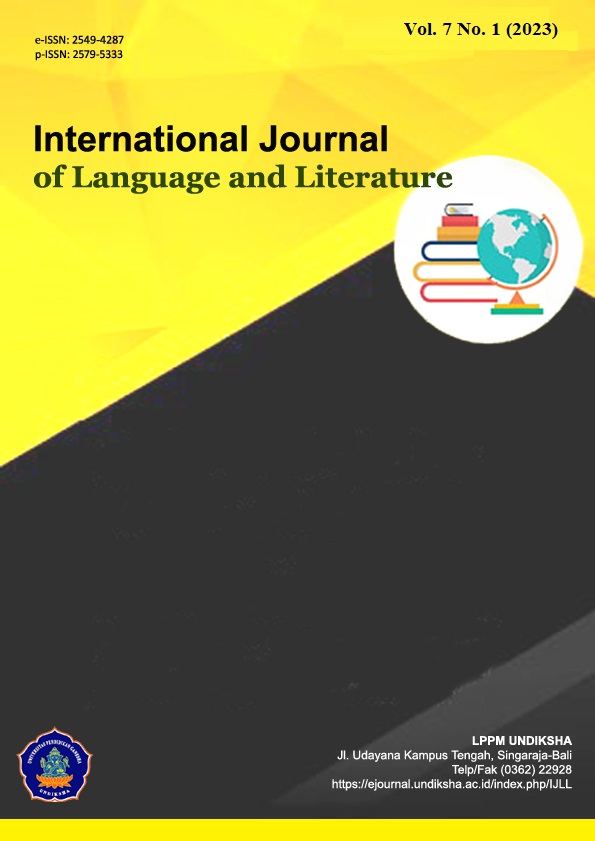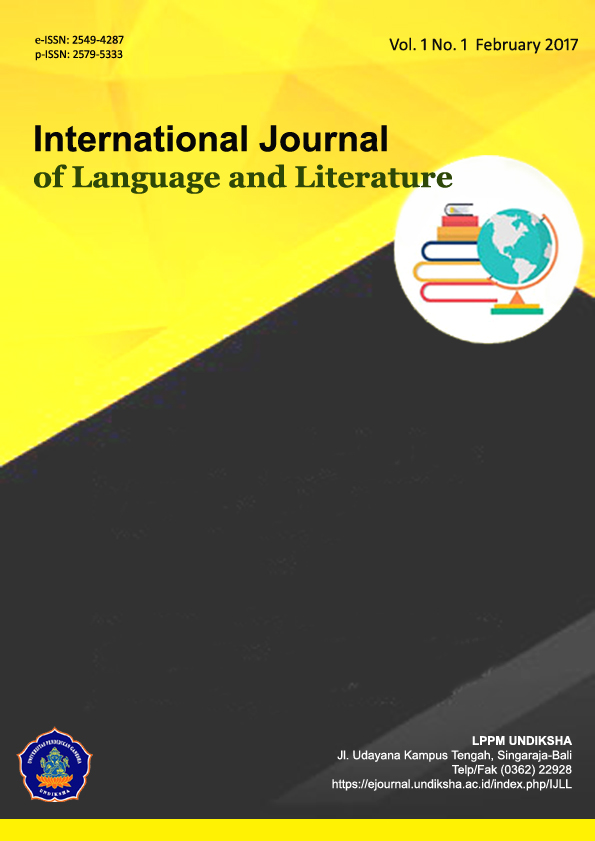AN An Investigation of Teachers’ Roles in Remote Teaching Context
DOI:
https://doi.org/10.23887/ijll.v7i1.61103Keywords:
Online learning, teachers’ role, teaching challengesAbstract
Remote teaching has emerged as an increasingly utilized learning strategy amidst the pandemic in order to mitigate the spread of the COVID-19 virus. Therefore this study aims to analyze the teachers’ roles and their challenges in the context of remote teaching. Moreover, the study was researched by using a qualitative method in which the data will be served descriptively. Specifically, observation and interview methods are used to collect data from two EFL teachers at the senior high school level. Data analysis consist of four process there are data collection, data reduction, data display, and conclusion drawing and verification.The result of this study showed that the teachers implemented eight different roles in the context of remote teaching namely controller, organizer, assessor, prompter, participant, resource, tutor, and observer. Furthermore, in applying for these roles, the teachers also faced some challenges from different categories such as poor connection, low motivation of students, difficulty in sharing and in preparing the learning material, limited access to learning platforms, and difficulty in the assignment process.
References
Agustina, D., Matra, S. D., & Karimah, S. (2020). Challenges of Having Online Learning Activities: University Students’ Perspectives. INELTAL Conference Proceedings The International English Language Teachers and Lecturers Conference, 9–14. http://ineltal.um.ac.id/wp-content/uploads/2020/12/Dwi-Agustina-Sarlita-D.-Matra-and-Sayyidatul-Karimah-Challenges-of-Having-Online-Learning-Activities_University-Students’-Perspectives.pdf.
Ahmad, P., & Triastuti, A. (2021). EFL Teachers’ Experiences During The Pandemic: Stories from Rural Area in Tungkal Ilir District. IJEE (Indonesian Journal of English Education, 8(2), 297–308. https://doi.org/10.15408/ijee.v8i2.22409. DOI: https://doi.org/10.15408/ijee.v8i2.22409
Akbarjono, A., Belawati, E., & Afriani, Z. L. (2022). Students’ Enthusiasm in Learning The COVID-19 Outbreak. Journal of Research on Language Education, 3(1), 15. https://doi.org/10.33365/jorle.v3i1.1773. DOI: https://doi.org/10.33365/jorle.v3i1.1773
Alhamuddin, A., & Zebua, R. S. Y. (2021). Perceptions of Indonesian Students on the Role of Teachers in Offline and Online Learning During the Covid-19 Pandemic Period. Jurnal Kependidikan: Jurnal Hasil Penelitian Dan Kajian Kepustakaan Di Bidang Pendidikan, Pengajaran Dan Pembelajaran, 7(4), 834. https://doi.org/10.33394/jk.v7i4.3881. DOI: https://doi.org/10.33394/jk.v7i4.3881
Anggriani, N. M. G., Artini, L. P., & Marsakawati, N. P. E. (2022). The Teachers’ Roles in An Online English Teaching. Lingua Scientia, 29(2), 77–85. https://doi.org/10.23887/ls.v29i2.37007.
Annisa, P. S. M., Saragih, B., & Bancin, H. T. D. (2021). Teacher Roles Used in English Classroom Interaction. Jurnal Darma Agung, 29(1), 135–145. https://doi.org/10.46930/ojsuda.v29i2.941. DOI: https://doi.org/10.46930/ojsuda.v29i2.1066
Aspers, P., & Corte, U. (2019). What is Qualitative in Qualitative Research. Qualitative Sociology, 42(2), 139–160. https://doi.org/10.1007/s11133-019-9413-7. DOI: https://doi.org/10.1007/s11133-019-9413-7
Aziz, F., & Kazi, A. S. (2019). Role of Teachers in Students’ Classroom Participation in Universities. International Journal of Educational Enquiry and Reflection, 4(1), 46–57. https://www.researchgate.net/profile/Asma-Shahid-Kazi/publication/330712579_Role_of_Teachers_in_Students_Classroom_Participation_at_University_Level/links/5ce9379392851c4eabbcb5f9/Role-of-Teachers-in-Students-Classroom-Participation-at-University-Level.pdf.
Cerezo, L., Caras, A., & Leow, R. P. (2016). The Effectiveness Of Guided Induction Versus Deductive Instruction On The Development Of Complex Spanish Gustar Structures. Studies in Second Language Acquisition, 38(2), 265–291. https://doi.org/10.1017/S0272263116000139. DOI: https://doi.org/10.1017/S0272263116000139
Clarin, A. S., & Baluyos, E. L. (2022). Challenges Encountered in the Implementation of Online Distance Learning. EduLine: Journal of Education and Learning Innovation, 2(1), 33–46. https://doi.org/10.35877/454RI.eduline591. DOI: https://doi.org/10.35877/454RI.eduline591
Dantes, G. R., Audina, I. P., Marsakawati, N. P. E., & Suwastini, N. K. A. (2022). Investigating the Zoom application as a video conferencing platform in the online learning process based on teacher’s perception. Janapati, 11(2), 133–144. https://doi.org/https://doi.org/10.23887/janapati.v11i2.48456. DOI: https://doi.org/10.23887/janapati.v11i2.48456
Fahmi, A. N., Yusuf, M., & Muchtarom, M. (2021). Integration of Technology in Learning Activities: E-Module on Islamic Religious Education Learning for Vocational High School Students. Journal of Education Technology, 5(2), 282–290. https://doi.org/10.23887/jet.v5i2.35313. DOI: https://doi.org/10.23887/jet.v5i2.35313
Febrianto, P. T., Mas’udahdah, S., & Megasari, L. A. (2020). Implementation of Online Learning during the Covid-19 Pandemic on Madura Island, Indonesia. International Journal of Learning, Teaching and Educational Research, 19(8), 233–254. https://doi.org/10.26803/ijlter.19.8.13. DOI: https://doi.org/10.26803/ijlter.19.8.13
Haka, N. B., Makrupah, S., & Anggoro, B. S. (2020). Pengembangan website online berbasis blended learning untuk meningkatkan penguasaan konsep mata pelajaran IPA. Jurnal Bioterdidik: Wahana Ekspresi Ilmiah, 8(1), 66–76. http://jurnal.fkip.unila.ac.id/index.php/JBT/article/view/20782.
Huang, Q. (2018). Examining Teachers’ Roles in Online Learning. The EuroCALL Review, 26(2), 3. https://doi.org/10.4995/eurocall.2018.9139. DOI: https://doi.org/10.4995/eurocall.2018.9139
Ilias, A., Baidi, N., Ghani, E. K., & Razali, F. M. (2020). Issues on the Use of Online Learning: An Exploratory Study Among University Students During the COVID-19 Pandemic. Universal Journal of Educational Research, 8(11), 5092–5105. https://doi.org/10.13189/ujer.2020.081109. DOI: https://doi.org/10.13189/ujer.2020.081109
Karuniasih, N. L. A. G. (2022). Exploring Readiness of Teachers Toward English Remote Teaching. Journal of Educational Study, 1(3), 134–149. https://doi.org/10.36663/joes.v1i3.204. DOI: https://doi.org/10.36663/joes.v1i3.204
Lai, C.-S., Au, K.-M., & Low, C.-S. (2021). Beyond Conventional Classroom Learning: Linking Emotions and Self-Efficacy to Academic Achievement and Satisfaction with Online Learning during the COVID-19 Pandemic. Journal of Education and E-Learning Research, 8(4). https://doi.org/10.20448/journal.509.2021.84.367.374. DOI: https://doi.org/10.20448/journal.509.2021.84.367.374
Liliana, R. A., Raharjo, W., Jauhari, I., & Sulisworo, D. (2020). Effects of the online interactive learning media on student’s achievement and interest in physics. Universal Journal of Educational Research, 8(3 B), 59–68. https://doi.org/10.13189/ujer.2020.081507. DOI: https://doi.org/10.13189/ujer.2020.081507
Lusiyani, R., & Dara Anindya, W. (2021). Choosing and Using Learning Media during Remote Teaching: Teachers’ Thought. Journal of English Language Teaching and Linguistics) e-ISSN, 6(2), 2021. https://doi.org/10.21462/jeltl.v6i2.555. DOI: https://doi.org/10.21462/jeltl.v6i2.555
Makarova, E. A., & Makarova, E. L. (2018). Blending pedagogy and digital technology to transform educational environment. International Journal of Cognitive Research in Science, Engineering and Education, 6(2), 57–65. https://doi.org/10.5937/ijcrsee1802057M. DOI: https://doi.org/10.5937/ijcrsee1802057M
Maria Josephine Arokia Marie, S. (2021). Improved pedagogical practices strengthens the performance of student teachers by a blended learning approach. Social Sciences & Humanities Open, 4(1), 100199. https://doi.org/10.1016/j.ssaho.2021.100199. DOI: https://doi.org/10.1016/j.ssaho.2021.100199
Miles, M. B., Huberman, A. M., & Saldana, J. (2014). Qualitative Data Analysis. Sage Publication.
Mukarromah, U., & Wijayanti, W. (2021). Implementation of the online learning at vocational high school during Covid-19: Between obligations and barriers. Jurnal Pendidikan Vokasi, 11(1). https://doi.org/10.21831/jpv.v11i1.37110. DOI: https://doi.org/10.21831/jpv.v11i1.37110
Musdalifah, U. K. S., & Jumiaty, A. A. (2022). Teachers’ Difficulties in Online Assessment for Students in Teaching English During Pandemics. Journal of Language Testing and Assessment, 2(1), 1–6. https://doi.org/10.56983/jlta.v2i1.12. DOI: https://doi.org/10.56983/jlta.v2i1.12
Nasrullah, M., Wahdaniar, N., & Saleh, S. (2022). Factors Causing Lack of Students’ Learning Motivation in the Online Learning Process During the COVID-19 Pandemic Class X at SMK Negeri 4 Sinjai. Pinisi Journal of Education and Management, 1(1). http://e-prints.unm.ac.id/id/eprint/208/1/30. Pinisi Journal of Education and Managemen_Factors Causing Lack of Students.pdf.
Nieto-Escamez, F. A., & Roldán-Tapia, M. D. (2021). Gamification as Online Teaching Strategy During COVID-19: A Mini-Review. Frontiers in Psychology, 12(May), 1–9. https://doi.org/10.3389/fpsyg.2021.648552. DOI: https://doi.org/10.3389/fpsyg.2021.648552
Nurhalisah, N. (2010). Peranan Guru Dalam Pengelolaan Kelas. Lentera Pendidikan : Jurnal Ilmu Tarbiyah Dan Keguruan, 13(2), 192–210. https://doi.org/10.24252/lp.2010v13n2a6. DOI: https://doi.org/10.24252/lp.2010v13n2a6
Nyudak, D. T., Putra, I. N. A. J., & Santosa, M. H. (2021). Investigating the Implementation of Online Learning in Remote Learning Context. Journal of Education Research and Evaluation, 5(2), 311. https://doi.org/10.23887/jere.v5i2.32857. DOI: https://doi.org/10.23887/jere.v5i2.32857
Rehman, R., & Fatima, S. S. (2021). An innovation in Flipped Class Room: A teaching model to facilitate synchronous and asynchronous learning during a pandemic. Pakistan Journal of Medical Sciences, 37(1), 1–6. https://doi.org/10.12669/pjms.37.1.3096. DOI: https://doi.org/10.12669/pjms.37.1.3096
Rindu, I., & Ariyanti, A. (2017). Teacher’s Role in Managing the Class during Teaching and Learning Process. Script Journal: Journal of Linguistic and English Teaching, 2(1), 83. https://doi.org/10.24903/sj.v2i1.77. DOI: https://doi.org/10.24903/sj.v2i1.77
Rinekso, A. B., Muslim, A. B., & Lesagia, O. (2021). Teaching Online in Pandemic Time: The Experience of Indonesian EFL Teachers. ETERNAL (English, Teaching, Learning, and Research Journal, 7(1), 117. https://doi.org/10.24252/Eternal.V71.2021.A9. DOI: https://doi.org/10.24252/Eternal.V71.2021.A9
Sadiku, L. M. (2015). The Importance of Four Skills Reading, Speaking, Writing, Listening in a Lesson Hour. European Journal of Language and Literature, 1(1), 29. https://doi.org/10.26417/ejls.v1i1.p29-31. DOI: https://doi.org/10.26417/ejls.v1i1.p29-31
Sadykhan, K., Azizkhoja, K., Gulnar, K., Nurlan, K., Askar, M., & Azimkhuzha, P. (2022). Research of pedagogical conditions for the development of students’ educational independence. Cypriot Journal of Educational Sciences, 17(5), 1838–1851. https://doi.org/10.18844/cjes.v17i5.7348. DOI: https://doi.org/10.18844/cjes.v17i5.7348
Safira, Y. F., Hadi, M. S., & Zaitun, Z. (2021). an Analysis of English Language Teaching Activities During Covid-19 Pandemic At Smp Purnama Jakarta. Journal of Languages and Language Teaching, 9(2), 212. https://doi.org/10.33394/jollt.v9i2.3528. DOI: https://doi.org/10.33394/jollt.v9i2.3528
Santelli, B., Robertson, S. N., Larson, E. K., & Humphrey, S. (2020). Procrastination and Delayed Assignment Submissions: Student and Faculty Perceptions of Late Point Policy and Grace within an Online Learning Environment. Online Learning, 24(3), 35–49. https://eric.ed.gov/?id=EJ1271877. DOI: https://doi.org/10.24059/olj.v24i3.2302
Sharma, R., Jain, A., Gupta, N., Garg, S., Batta, M., & Dhir, S. (2016). Impact of self-assessment by students on their learning. International Journal of Applied and Basic Medical Research, 6(3), 226. https://doi.org/10.4103/2229-516x.186961. DOI: https://doi.org/10.4103/2229-516X.186961
Surakarta, I. A. I. N., Nugroho, A., Haghegh, M., Cyprus, E. M. U. N., & Turkey. (2021). Emergency Remote Teaching amidst Global Pandemic: Voices of Indonesian EFL Teachers. VELES Voices of English Language Education Society, 5(1), 66–80. https://doi.org/10.29408/veles.v5i1.3258. DOI: https://doi.org/10.29408/veles.v5i1.3258
Widyastuti, N., Riswandi, R., & Fitriawan, H. (2021). The development of advance organizer based distance learning in Chemistry bonding material. Journal of Education Technology, 5(2), 228–235. https://doi.org/10.23887/jet.v5i2.33613. DOI: https://doi.org/10.23887/jet.v5i2.33613
Downloads
Published
How to Cite
Issue
Section
License
Copyright (c) 2023 Ni G.A Made Ari Dharma Pattni

This work is licensed under a Creative Commons Attribution-ShareAlike 4.0 International License.
IJLL Journal provides immediate open access to its content on the principle that making research freely available to the public to supports a greater global exchange of knowledge.

This work is licensed under a Creative Commons Attribution-ShareAlike 4.0 International License








